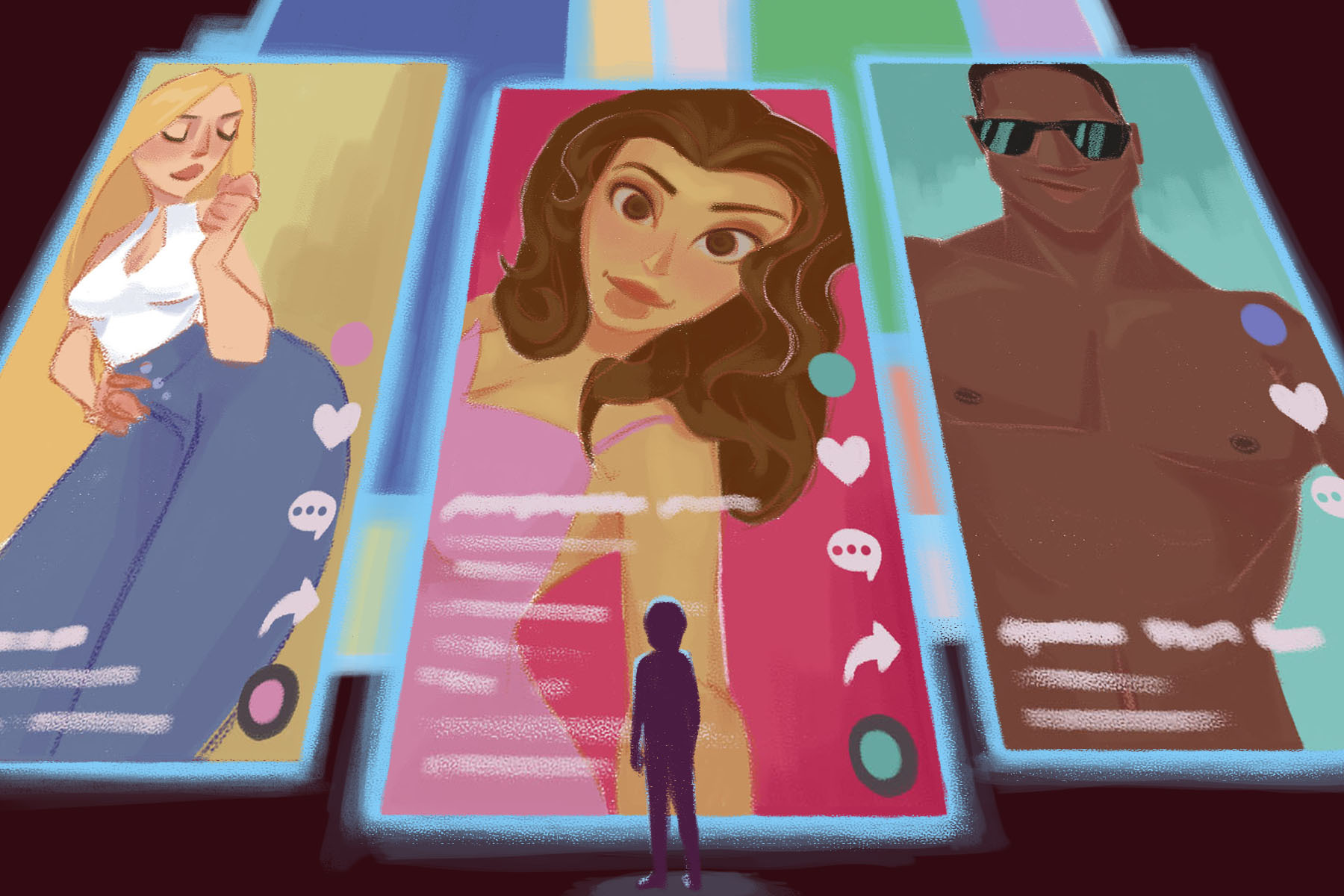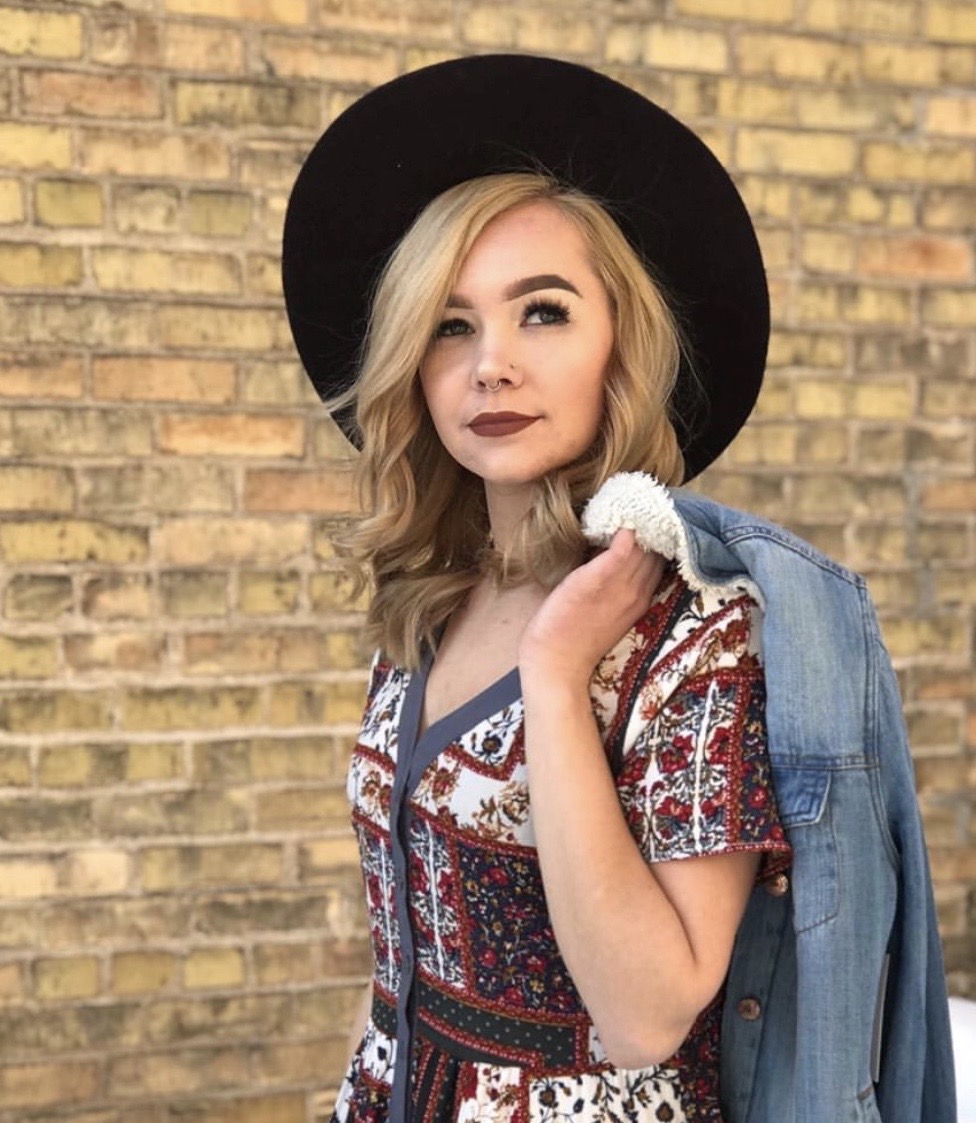While TikTok seems to be just a harmless video app, it can actually have a pretty negative effect on people’s body image. It’s widely known that conventionally attractive people have more success on the app, and the algorithm wants everyone to see it. The “For You” page is noticeably full of beautiful people — young TikTokers with perfect hair, faces and bodies. With every scroll, there’s another person that you can, and probably will, compare yourself to.
In addition to the “For You” page being plastered with videos of users who fit conventional beauty standards, there are also challenges on TikTok that exist solely to make you feel bad about the way you look. An example of one of these toxic trends is called the “back profile challenge,” in which users take a video of themselves with their back facing the camera and then film their reaction when they watch the first video.
Many of the popular “back profile challenge” videos are of girls who are confident in their bodies and appear pleased with the way their back profile looks. There’s nothing wrong with this fact alone, and it’s a step in the right direction to see girls who are comfortable and happy with their bodies; however, sprinkled in between these videos are the ones where girls are unhappy or even seemingly horrified with the way they look from the back.
Additionally, people who search the challenge will mostly find videos of girls who look conventionally attractive from behind, and they might think something is wrong with them if they don’t look like those girls.
Another toxic phenomenon we’re seeing on TikTok is eating disorder content. Though somewhat reminiscent of the pro-anorexia content that took over Tumblr in the 2010s, these TikToks are often more disguised and may not be seen as inherently toxic.
For example, one trend on TikTok, known as the “what I eat in a day challenge,” consists of short clips of everything someone has eaten that day. It’s sometimes paired with a clip of their body, so people can see what they look like. While this challenge seems relatively harmless, it can actually be damaging to viewers.
All it takes is a quick trip to the comment section. Under a video of a thin girl eating smaller meals, you’ll find comments like, “after seeing you I’m just going to eat ice,” “oh um, I’m not hungry anyways” and “I think water sounds good for dinner,” along with other similar statements. Although comments like these are often just jokes and likely aren’t overly harmful, it shows how this content can cause insecurity and low self-esteem.
TikTok Toxicity Affects Celebs Too
Body image issues on TikTok aren’t only affecting the average users. The 15-year-old TikTok star Charli D’Amelio recently spoke out about toxic body negativity on the app. Despite her young age, D’Amelio’s videos are often bombarded with hurtful comments about the way she looks.
In a series of tweets from April, D’Amelio made it clear she was fed up with these comments. She wrote, “STOP TALKING ABOUT MY BODY! it’s not your place to tell me if i’m losing weight or gaining weight.” In a second tweet, she urged people to “be kind and uplift everyone instead of trying to bring others down.”
why don’t we all just be respectful and understand that we should just be kind and uplift everyone instead of trying to bring others down and i’ve seen these videos about me my friends and complete strangers but it doesn’t matter who you’re doing it to-
— charli (@charlidamelio) April 27, 2020
Another TikTok star, Addison Rae, has also taken to Twitter to address negative comments about her body. She said, “i’ve seen 5-10 tweets & tiktoks today talking negatively about my body and weight.” In a follow-up tweet, she offered advice: “if you are healthy and happy, do NOT listen to these hurtful comments.”
Pop artist Lizzo, who has a following of over 7 million on TikTok, believes that the app has actually deleted her videos in which she wears bathing suits. The text on Lizzo’s video accusation reads “Tiktok keeps taking down my videos with me in my bathing suits but allows other videos with girls in bathing suits. I wonder why?”
Lizzo isn’t the only one who believes her content is censored due to her body. In fact, TikTok has long been under scrutiny for the belief that the algorithm intentionally boosts videos from TikTokers who subscribe to standard beauty ideals.
Back in March, documents from TikTok revealed that moderators of the app were told to suppress videos from users who had an “abnormal body shape,” along with a variety of other traits. Although it’s unclear if these practices are widely used, it’s still interesting — and not surprising — that TikTok has these guidelines in the first place.
https://twitter.com/PopCraveMusic/status/1235603391331565570
How to Take Action
So, we know that TikTok can negatively impact body image, but what can we do about it? We can’t make this kind of content disappear, but what we can do is monitor, to an extent, what we see on our feed.
First, it’s important to limit your time on the app in general. It’s easy to get caught up in endless scrolling, but this can have a damaging effect, especially if every other video makes you feel bad about yourself.
A couple helpful features that can prevent you from seeing certain content are the “hide videos from this user” and “hide videos with this sound” buttons. Some sounds on TikTok are used for trends or challenges that might negatively affect your body image, and it’s okay to opt out of watching those videos. To see these options, just hold down on a video until the menu pops up, then click “more.”
Finally, follow users that make you feel good about yourself. On TikTok, we often spend too much time on the “For You” page and not enough time on the “Following” page. This is the best way to choose what you see on the app because you can hand-select whose videos you see.
TikTok can be great sometimes; it can inspire, empower and encourage creativity. It can bring people together during tough times, and it can always provide a good laugh. Still, it’s important to realize that it can also be toxic and damaging. If we can learn to use TikTok in a healthy and positive way, it can be a platform that defines and uplifts a generation without bringing others down in the process.

















